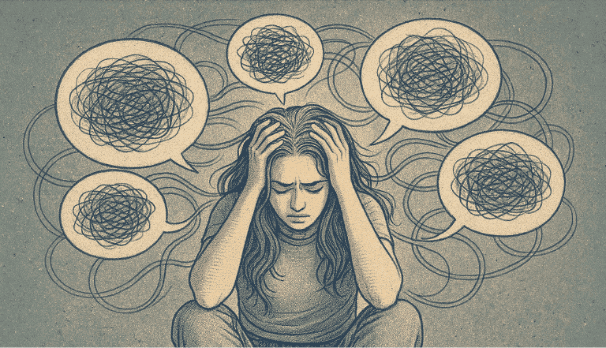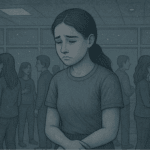Key Takeaways
- Anxiety and depression are deeply connected conditions that often overlap in brain chemistry, symptoms, and risk factors, making it common for people to experience both simultaneously.
- Shared causes, including genetics, stressful life experiences, and negative thought patterns, can trigger either condition or both, highlighting their close relationship.
- Despite their connection, the two conditions differ in focus and energy: anxiety is future-oriented and creates restlessness, while depression is tied to present or past struggles and leads to fatigue and hopelessness.
- Recognizing the distinct emotional and physical symptoms of each helps with proper diagnosis and treatment, ensuring individuals get the comprehensive care they need.
- A Mission For Michael (AMFM) offers specialized treatment programs that address both anxiety and depression through evidence-based therapies, helping individuals understand their symptoms, develop effective coping strategies, and achieve lasting mental wellness.
Understanding the Anxiety-Depression Connection
If you’re experiencing anxiety, depression, or both, you’re not alone. These two conditions are among the most common mental health challenges people face, and they’re deeply connected. Many people wonder whether they’re dealing with anxiety, depression, or something that combines elements of both.
Understanding how these conditions relate to each other, what causes them, and how they differ helps you recognize what you’re experiencing and seek the right support. While anxiety and depression have distinct characteristics, they share common roots and often appear together, creating a complex picture that requires comprehensive treatment.
Founded in 2010, A Mission For Michael (AMFM) offers specialized mental health care across California, Minnesota, and Virginia. Our accredited facilities provide residential and outpatient programs, utilizing evidence-based therapies such as CBT, DBT, and EMDR.
Our dedicated team of licensed professionals ensures every client receives the best care possible, supported by accreditation from The Joint Commission. We are committed to safety and personalized treatment plans.
How Anxiety and Depression Are Related
The Overlap Between Conditions
Anxiety and depression share significant overlap in their underlying mechanisms. Both involve similar changes in brain chemistry, particularly in neurotransmitters that regulate mood, sleep, and stress response. The brain regions affected by these conditions overlap as well, which explains why symptoms can blend together.
People experiencing one condition frequently develop the other. The constant strain of living with anxiety can lead to exhaustion, hopelessness, and eventually depression. Similarly, the isolation and negative thinking patterns that come with depression often trigger worry and anxiety about the future.
Why They Often Occur Together
The relationship between anxiety and depression is bidirectional, meaning each can influence and intensify the other. When you’re anxious, the persistent worry and physical tension drain your emotional resources, making you vulnerable to depression. When you’re depressed, hopelessness can fuel anxiety about whether things will ever improve.
Both conditions also respond similarly to stress and share many of the same risk factors. Traumatic experiences, chronic stress, major life changes, and ongoing difficulties can trigger either condition or both simultaneously.

Anxiety and depression are closely interconnected conditions that share similar brain chemistry changes and often occur together.
Common Causes of Anxiety and Depression
Brain Chemistry and Biology
Both anxiety and depression involve changes in brain chemistry and function. Neurotransmitters, the chemical messengers in your brain, play crucial roles in regulating mood, sleep, appetite, and stress response. When these systems aren’t working optimally, symptoms of anxiety, depression, or both can develop.
Genetics also contributes to your vulnerability to these conditions. If family members have experienced anxiety or depression, you may be more susceptible, though this doesn’t guarantee you’ll develop these conditions.
Life Experiences and Stress
Difficult life experiences often trigger both anxiety and depression. Trauma, loss, major life transitions, chronic stress, relationship problems, and ongoing challenges can overwhelm your ability to cope. The way your brain responds to these stressors can manifest as anxiety, depression, or both.
Childhood experiences, particularly those involving instability, neglect, or trauma, can increase vulnerability to both conditions later in life. However, stressful experiences at any age can contribute to the development of anxiety and depression.
Personality and Thought Patterns
Certain thinking styles and personality traits increase vulnerability to both conditions. Perfectionism, negative self-talk, tendency to worry excessively, and difficulty managing uncertainty can contribute to anxiety and depression. These patterns aren’t character flaws; they’re learned responses that can be changed with appropriate support.
How you interpret and respond to challenges also plays a role. If you tend to catastrophize situations, focus on worst-case scenarios, or blame yourself for things outside your control, you may be more susceptible to developing anxiety or depression.
Recognizing Anxiety Symptoms
Emotional Signs of Anxiety
Anxiety primarily involves excessive worry and fear that feels difficult to control. You might find yourself constantly anticipating problems, imagining worst-case scenarios, or feeling like something bad is about to happen. Restlessness, feeling on edge, and irritability are common emotional experiences with anxiety.
Many people with anxiety describe feeling overwhelmed by their thoughts, unable to quiet their mind, or experiencing intense fear about specific situations or general uncertainty about the future.
Physical Symptoms of Anxiety
Anxiety creates distinct physical sensations. Your heart might race or pound, you may experience shortness of breath, or feel like you can’t get enough air. Muscle tension, particularly in your neck, shoulders, and jaw, is extremely common. You might feel shaky, sweaty, or dizzy.
Digestive issues like nausea or stomach pain frequently accompany anxiety. Sleep problems, particularly difficulty falling asleep due to racing thoughts, are also characteristic of anxiety.

Anxiety manifests through both emotional symptoms, like excessive worry, and physical symptoms, including tension and rapid heartbeat.
Recognizing Depression Symptoms
Emotional Signs of Depression
Depression centers on persistent sadness, emptiness, or hopelessness that doesn’t lift. You might lose interest or pleasure in activities you once enjoyed, feel emotionally numb, or struggle to experience positive emotions. Feelings of worthlessness, excessive guilt, or self-criticism are common with depression.
Many people describe feeling like they’re moving through life without purpose or meaning. Concentration and decision-making become difficult, and thoughts may turn dark, including wondering whether life is worth living.
Physical Symptoms of Depression
Depression significantly affects physical functioning. Fatigue and low energy are hallmark symptoms; even simple tasks can feel exhausting. Sleep patterns often change dramatically, with some people sleeping much more than usual while others experience insomnia.
Appetite and weight changes are common, whether increased or decreased. You might move more slowly, speak more quietly, or feel physically heavy. The physical exhaustion of depression makes it difficult to maintain routines or engage in self-care.
Key Differences Between Anxiety and Depression
Focus and Orientation
One key difference lies in temporal focus. Anxiety primarily involves fear and worry about the future: what might happen, what could go wrong, and how you’ll handle upcoming challenges. Your mind races ahead, anticipating problems and preparing for threats.
Depression focuses more on the past and present. You might feel regret about what happened, sadness about current circumstances, and hopelessness about whether the future will improve. Rather than racing forward with worry, depression pulls you into rumination.
Energy and Motivation
The quality of energy differs significantly between these conditions. Anxiety typically creates a restless, agitated energy. You feel wound up, tense, and unable to relax, even when exhausted. Your body feels activated and on alert.
Depression brings low energy and fatigue. Motivation disappears, and even small tasks feel overwhelming. Rather than restless energy, depression creates a heavy, sluggish feeling that makes movement difficult.
Physical Experience
While both conditions affect the body, the physical experiences differ. Anxiety tends to create activation symptoms: rapid heartbeat, quick breathing, muscle tension, and digestive upset. Your body feels revved up and ready for action.
Depression typically creates deactivation symptoms, like slowness, heaviness, fatigue, and reduced physical responsiveness. Your body feels like it’s shutting down rather than ramping up.
Why Choose AMFM for Anxiety and Depression Treatment

AMFM provides comprehensive treatment for anxiety and depression in supportive environments designed to promote healing and recovery.
At AMFM, we understand the complex relationship between anxiety and depression. Our treatment programs address both conditions comprehensively, recognizing that effective treatment must consider how these conditions interact in your unique experience.
Our residential programs provide intensive, 24-hour support in comfortable environments where you can focus entirely on understanding your symptoms and developing effective coping strategies. Through evidence-based therapies including cognitive behavioral therapy and mindfulness-based interventions, you’ll learn practical tools for managing both conditions.
For those who need structured daily support while maintaining some flexibility, our partial hospitalization programs offer comprehensive treatment with evening hours at home. These programs help you apply new skills in real-world situations while receiving ongoing therapeutic support.
Our outpatient programs serve individuals ready to continue their healing while managing work and personal responsibilities. These programs provide ongoing therapy and support that help maintain progress and prevent symptoms from returning.
Our family education programs help loved ones understand anxiety and depression, learn supportive communication strategies, and develop healthy responses that encourage their healing journey.
With facilities in California, Virginia, Minnesota, and Washington state, AMFM provides welcoming, evidence-based treatment environments. We work with most major insurance providers and make beginning treatment straightforward.
Frequently Asked Questions (FAQ)
Can you have anxiety and depression at the same time?
Yes, anxiety and depression frequently occur together. Many people experience symptoms of both conditions simultaneously. This combination requires treatment that addresses both conditions comprehensively.
Which comes first, anxiety or depression?
Either condition can develop first. Sometimes chronic anxiety leads to depression as the constant stress becomes exhausting. Other times, depression develops first and triggers anxiety about the future. The order varies for each individual.
Are anxiety and depression treated the same way?
While anxiety and depression share some treatment approaches, effective treatment recognizes the distinct aspects of each condition. The best outcomes come from comprehensive treatment that addresses your specific combination of symptoms.
How long does treatment for anxiety and depression take?
Treatment timelines vary based on symptom severity and individual factors. Some people notice improvement within weeks, while deeper healing typically occurs over several months. Treatment is about developing skills and creating lasting change.
How does AMFM treat both anxiety and depression together?
AMFM’s programs use evidence-based therapies that effectively address both conditions. We help you understand how anxiety and depression interact in your experience, develop targeted coping strategies for each set of symptoms, and build overall resilience that supports lasting recovery.












